Well, this is it! We're on the plane back to Portland, and I reckon the best way to keep myself from falling asleep before my bed time is to tell you all about the day we spent hiking in the Auvergne region of France. It was a stunning finale to our trip—although David, who seems to have come down with the slapstick bug, suffered several Inspector Clouseau-style mishaps over the course of the day, including falling down, mis-aligned socks, getting electrocuted, and being rejected by cows. Please forgive me if this post is more rambling and incoherent than usual; I've been up for 24 hours and don't feel up to much in the way of editing!
So. One thing that's very different about hiking in France than hiking in Oregon, where I usually do it, is that the vast majority of the land here is to some degree cultivated. Auvergne and the Massif Central, in the center of the country, are some of the least populated areas in France, but the land here is still in active use—in other words, you can go to the country, but you can't (or at least we didn't) really go to the wilderness. The hundreds of square miles of virgin forest that still, despite the best efforts of loggers, exist in the Pacific Northwest, are not present here. Instead there are the kind of gentle rolling hills and sweeping meadows of wildflowers you see above. Unlike in Oregon, you can see destinations approaching for kilometers and even miles, as you stride toward them through clear, undulating countryside. It's breathtaking.
However, another side-effect of the relatively high-density land use is that, unlike in Oregon, one doesn't just arrive at a trailhead and start hiking, confident that one can more or less remain on said trail the whole way along. French hiking trails are incorporated into the populated landscape, passing through towns, by the sides of industrial parks, and along all possible varieties of path including paved highway, grass footpath, logging road, gravel campground track, the fenced border of someone's cow pasture, another person's driveway, dirt road, and private driveways. The dense network of trails and directory stations that branch off of the GR30 (one of Europe's long, multi-day "Grande Randonées") often traverse private property in a way disconcerting to American sensibilities. It's also disorienting to anyone who's expecting to a) get to the country before starting on a hike, or b) encounter clearly-signed directions to a particular trailhead (there are just too many of them).
For example, the beginning of our hike: we never actually found it. What we found was an entry point to the trail at one step beyond the point we were directed to enter, and we figured that was good enough. After parking the car at a little pull-out on the outskirts of the small town where we were staying, we went through the following steps, some of them described in our hiking book and others not:
- Walk along a paved service road where there are several industrial supplies warehouses;
- Turn right into what looks like part supply-delivery road, part private driveway (this right turn is not mentioned in the book);
- Walk to the end of the private driveway, squeeze past the owner's car, and pass through a series of rusty metal gates in order to cross the railroad tracks into a wood;
- Walk through the woods for five minutes before coming to a highway; cross the highway;
- Jog to the right, following a street in the neighboring hamlet, before turning right on a cobbled logging road marked "private property."
And so on. Accustomed to an altogether less cozy style of hiking, we kind of couldn't believe many of these steps were for real. "This really looks like a driveway," said David several times, or "Isn't this somebody's cow pasture?" American farmers are not kidding around when they put up Private Property signs, so we were a bit skittish. Soon, though, we became accustomed to the intimacy of hiking through fields and towns rather than wilderness. It was lovely, for instance, to arrive in L'Usclade (described in our book as a "semi-abandoned hamlet"), where flowing water troughs, crumbling stone houses and rusty farm equipment made a fitting backdrop to the leaf fire that one of the few remaining farmers was stoking in his field. He looked up and nodded to us amiably as we passed, despite the rope spanning the trail a kilometer or so back, which I can only assume was intended to discourage someone from entering. Apparently that someone was not us.
Let me tell you something else unexpected about this walk, though: it was hard! I had assumed that the only way a 20-kilometer (12-mile) hike could be classed as "easy to moderate," as this one was, is if it were pretty much flat the whole way. I'd been telling people this for months: the hike we're doing in France is long but flat. Nothing of the sort, my friends. David and I were soon huffing and puffing up the brutally steep grade, trying to convince ourselves that our breathlessness was down to a higher-than-customary altitude, but knowing all the time that we just weren't conditioned for this kind of steep uphill trek. Soon after L'Usclade our book told us the trail would "start to steepen," and indeed it did, as we traversed fields of yellow, purple and white wildflowers, then entered a shadowy beech wood, rife with vibrant moss and rushing mountain streams. This part of the trail reminded me a lot of Oregon, except for the combination of "Private Property" signs mounted on barbed wire fences, along with helpfully-positioned ladders allowing hikers to climb over them.
Coming out of the wood at the same steep angle we entered it, we emerged into an open meadow full of ancient-looking stone walls crossing this way and that along the slope. In the near distance a flock of cows ruminated, their bells clanking with a soothing sound. The field was also the home of a large number of light-green, upright plants like those you see above. They're apparently gentian plants, which we found out when we were hailed by this freelance gentian-harvester. He told us he was gathering the roots to sell in town, where they make a digestif out of it. He then showed us the enormous tined fork he uses to pry the huge roots from the ground, and gave David a piece to chew on raw (knowing it was bitter, I politely declined). He seemed gratified at our little conversation; in the hybrid Franglais we were using to communicate, he told us that lots of hikers come by on the trail and many of them photograph him, but few will stop to chat. Understandably, this made him feel like a wild animal on some kind of tourist safari.
The conversation with the gentian-harvester also gave me some food for thought. We asked him for directions up to Puy Gros, and he told us to keep on as we were going and then turn right at the cows. Those who have read Samuel Becket''s Molloy may remember that there's a gag in that book where the main characters follow and re-trace the same path one after the other, which the reader realizes because they're passing the same landmarks. Except that the things Beckett uses as "landmarks" are stuff that can change position, like dogs and sheep. I always interpreted this as an existentialist comment on the unreliability of the human sense of recognition...but maybe not! Maybe it's just the reality of walking in rural France!
The wind came up as we turned right by the cows, and we put on our jackets and gloves to scale the formation above, known as Puy Gros. Possibly the steepest bit yet, it eventually rewarded us with spectacular views over the whole Dordogne Valley. La Bourboule spread out to one side of us, with its sister-town of Mont Dore on the other, and various fields and rock formations clustering all around us on the other sides. Not to mention, the top of Puy Gros is one side of a little plateau, so we had a few welcome kilometers of walking on the flat ground before a short but precipitous descent.
I should backtrack a bit at this point and tell you about David's morning, which was not going so smoothly. First of all there was an embarrassing incident at breakfast, in which I looked down at my croissant for a moment only to look up again and find David coughing and spluttering, features distorted and eyes watering horribly, with Earl Gray tea streaming out of his mouth and nose all down the front of his shirt and pants. Then we got back to the room and met up with the room service maid, who may have looked askance at David's OCD-inspired decision to take the toilet-paper rolls off their holder and perch them at a jaunty angle on top of the towel rack. "What is WRONG with that couple in 102?" we imagined them asking. "Do all Americans behave like this?" Such speculations set David off on a laughing jag that reduced him to tears. "Okay," he said, after it was over, "I'm ready for bed now. I've had a hard day."
But of course he didn't go to bed. Instead, while we were trying to find the elusive trailhead, he ran almost a mile round-trip trying to figure out whether a certain trail was the one we wanted. Then, coming down from Puy Gros, he stumbled and fell hard, gouging his thigh on a rocky outcropping. A good sport as always, he hobbled down into the valley, assuring me that he just needed to keep moving so nothing would get stiff. The wildflower-strewn fields grew truly spectacular as we climbed a few more stile-ladders and made our way across pastureland. For a kilometer or so we shared the field with these horses and foals, most of whom showed much less interest in us than we did in them. A single stallion did stand right in the middle of the path and inspect David's outstretched hand before allowing our disappointingly apple- and carrot-free selves to pass on over the next stile.
The great thing about the more densely-settled French style of hiking, is that you're never far away from a source of lunch, dinner or wine. My understanding is that people doing a Grande Randonnée, which can take two weeks or more, expect to stay in inns along the way pretty much every night, partaking of a hot meal and a shower-bath and sleeping in a real bed. (Which, as an aside, sounds like about the best holiday I can imagine, and has me dreaming about another hiking vacation in Europe—maybe in the south of England?) So, with this hike, there is a lovely little lakeside inn at more or less the halfway-point, where we arrived just as it was beginning to sprinkle. Even though we arrived at the awkward hour between 2:30 and 7, when most French restaurants are closed, the friendly innkeeper provided us with a half-bottle of local red wine, a basket of bread, and a plate each of their local cheeses: Cantal, Saint-Nectaire, and Auvergne Bleu. We whiled away a delightful 45 minutes, gazing out across the lake and watching a bus-load of French schoolboys, who seemed to be on some kind of field trip, cheering a fisherman as he reeled in a fish. By the time we were ready to walk again, the drizzle had cleared up.
We next had to cut along the side of the lake, which was very marshy in places. David stepped into a patch of mud and sank in almost to the top of his hiking boots. Smugly, I looked at him and thought "I won't sink in that far; I'll find a better way." I walked over to a patch of firmer-looking mud, took a step, and sank into the mud halfway to my knee. David said it looked like the mud was eating me alive, although there were no real ill effects besides getting muddy.
For him, unfortunately, the way back was more challenging. His boots are getting old, and his feet started to blister as we strode back along the disused gravel road leading between more wildflower fields and up to a series of abandoned farm buildings. In the chill wind kicking up occasionally over the fields, we stopped a few times for him to nurse his various injuries. The farm buildings presided over this whole phase of the walk, gradually drawing nearer and creating a melancholy yet aesthetically appealing atmosphere. I don't know anything about the place's history, but the buildings are long-abandoned, with trees growing through the floor and the roof of the erstwhile cabin. Intriguingly, the construction of the outbuildings looks fairly recent, as if they were abandoned shortly after being built. As we agreed passing by, "I guess things didn't work out at the farm."
Of all David's setbacks throughout the day, he claims that the most emotionally trying came just after we rounded a bend for a dual view of the Puy Gros and the Banne d'Ordanche, and he held out his gloved hand to a group of cows lying down in a field...only to have them leap to their feet and start heaving at us in something between a sigh and a growl. We weren't sure if they were interested in us or threatening us, but they continued to mill around excitedly as we made our way down the slope. "Oh dear," he said, "I shouldn't have disturbed them." "I think they heard about the incident at breakfast," I said. "They're appalled at your behavior." To top things off, shortly after the cow incident he got an unexpected shock from an electric fence under which I had passed with no incident.
The last three or four kilometers brought us back on our steps, as we plodded down the same steep slopes we'd worked so hard to scale: back past the gentian field and through the beech wood, back through the wildflowers and the water troughs of L'Usclade, back down the cobbled logging road, across the highway, through the metal gates and down the townperson's driveway, past the warehouses and back to our car. When you take into account several wrong turnings that added distance, it was well over twelve miles in total and more challenging than anything we've done in a while, but a gorgeous and rewarding way to cap off our trip. Even David, in his hobbled and electrocuted state, heartily agrees.
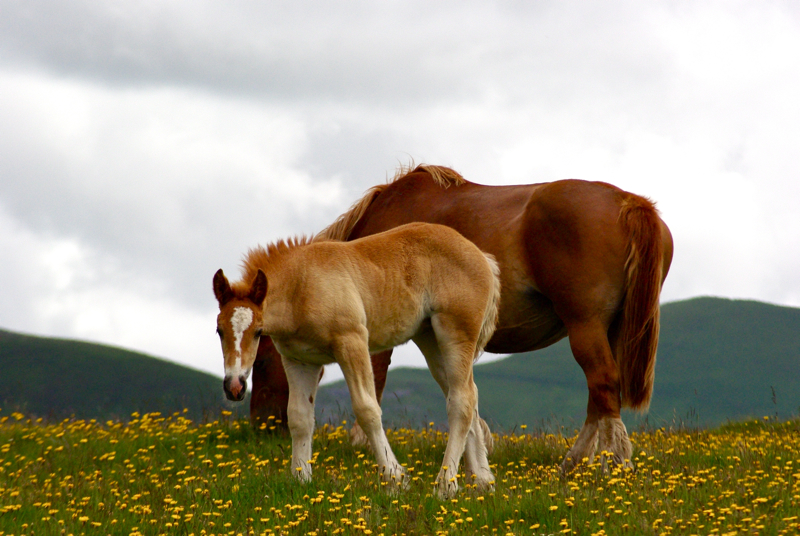
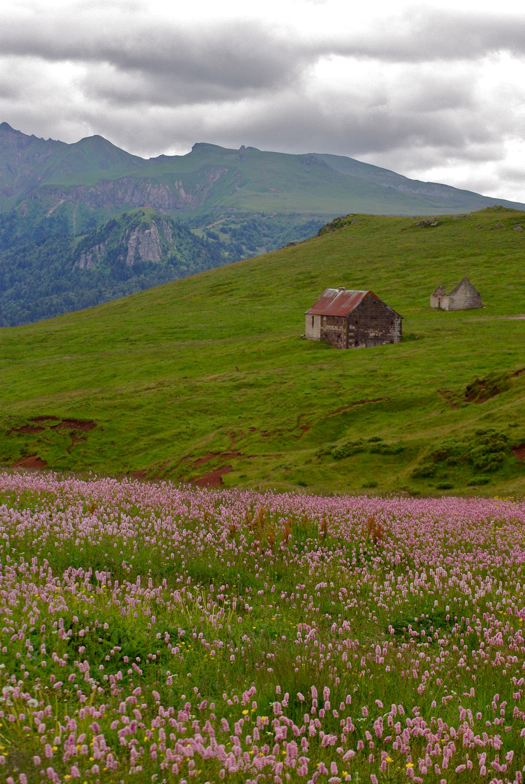
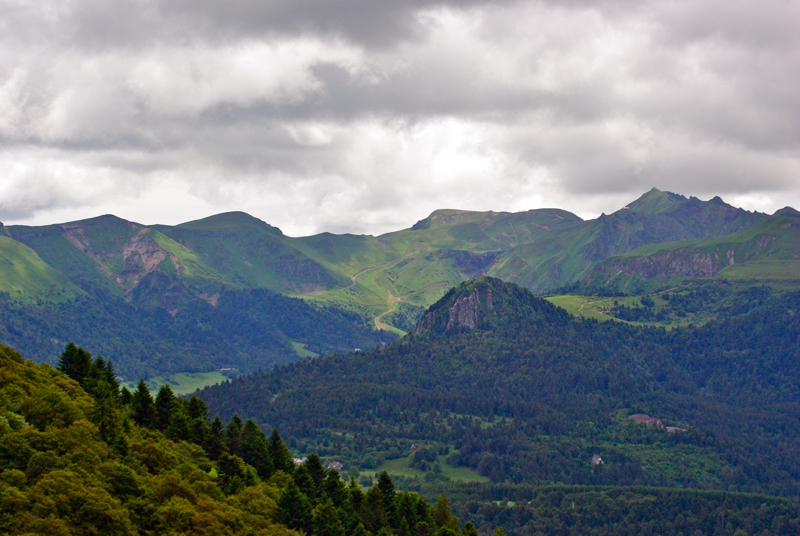
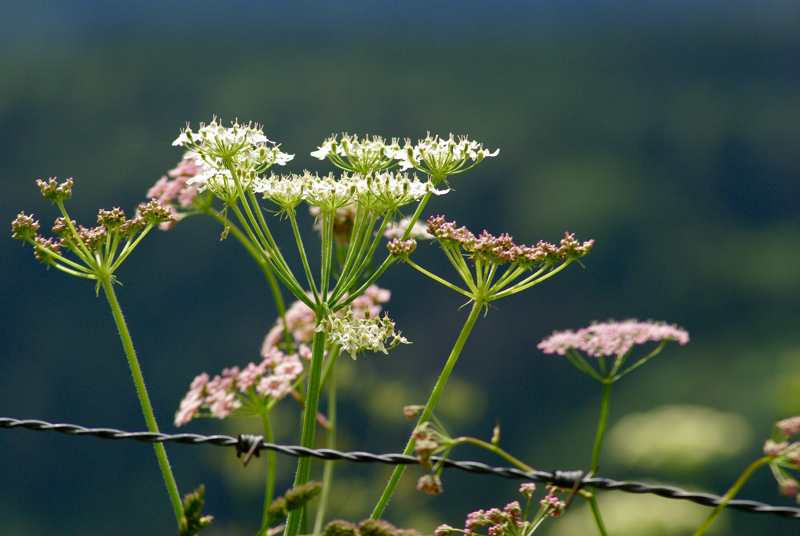
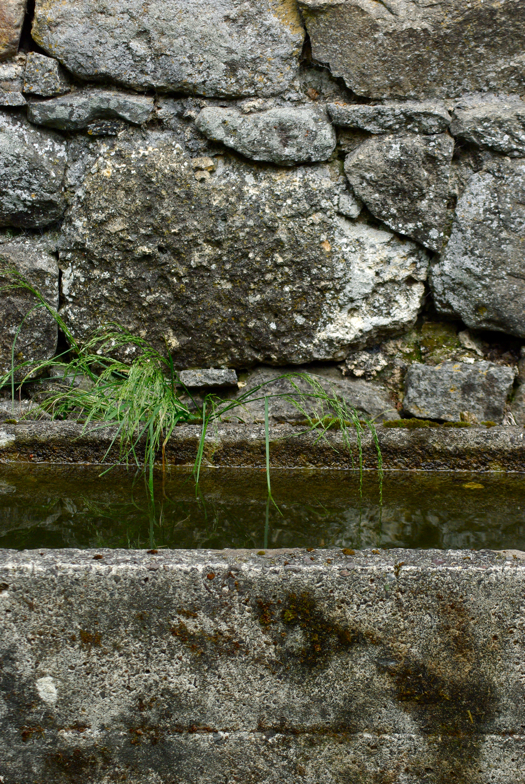
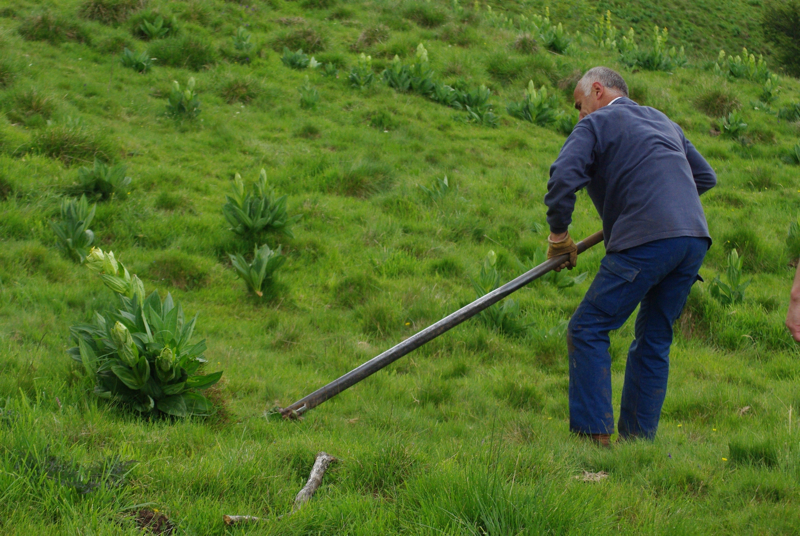
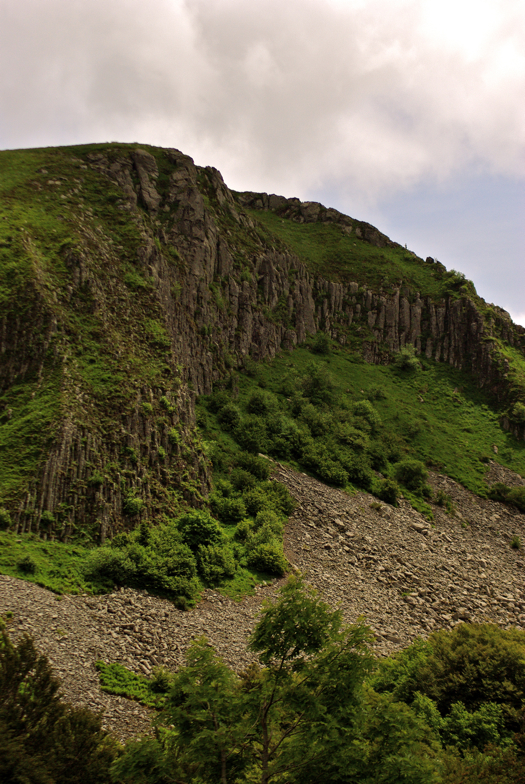
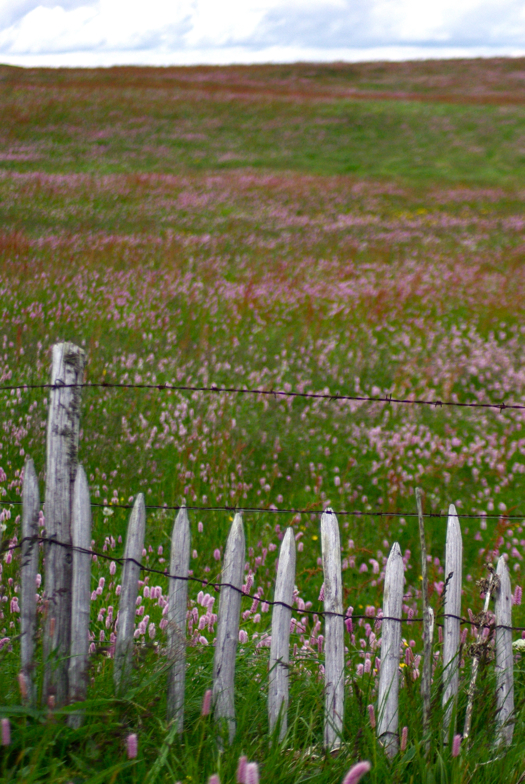
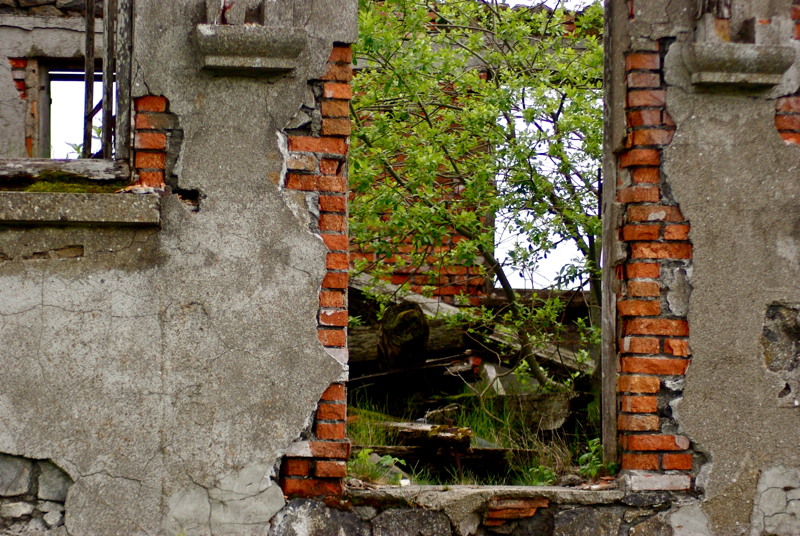
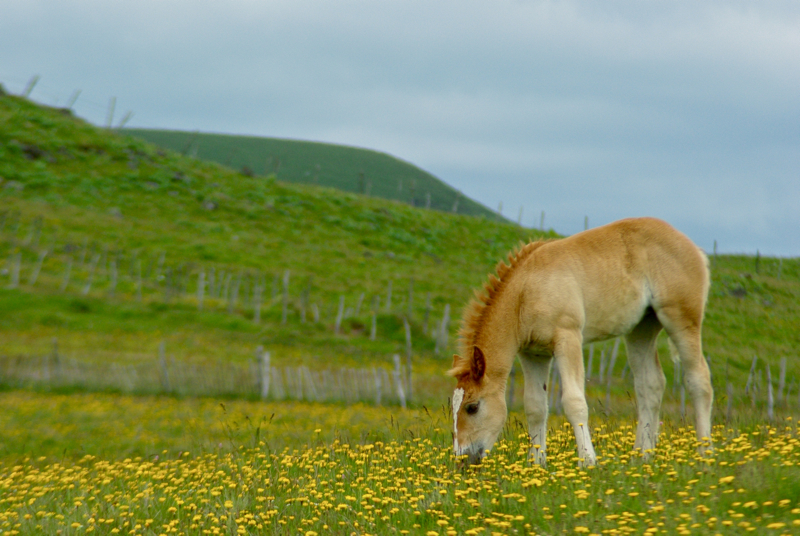
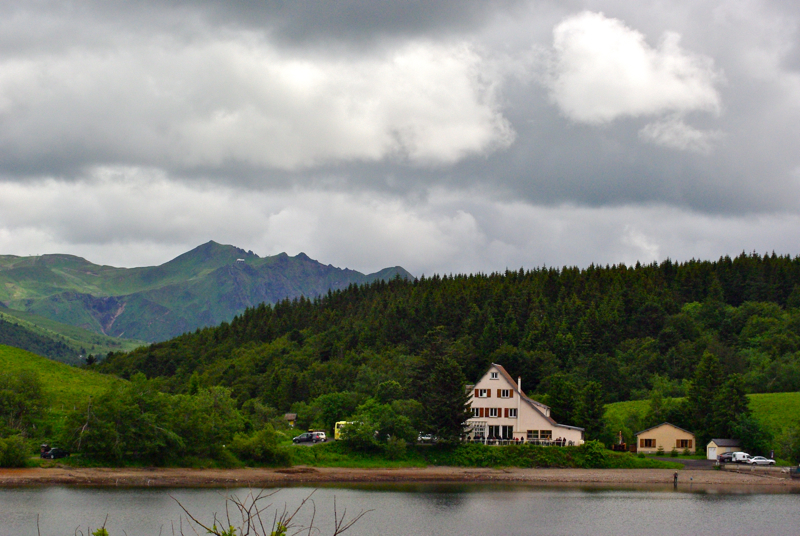
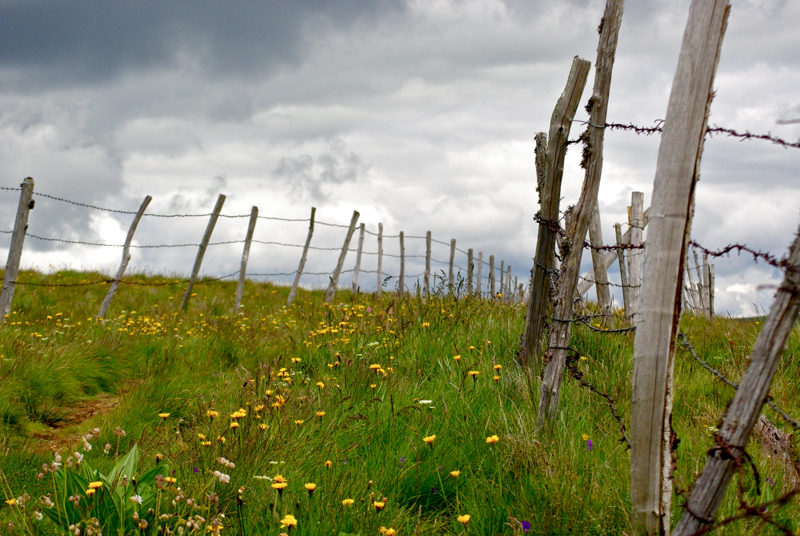
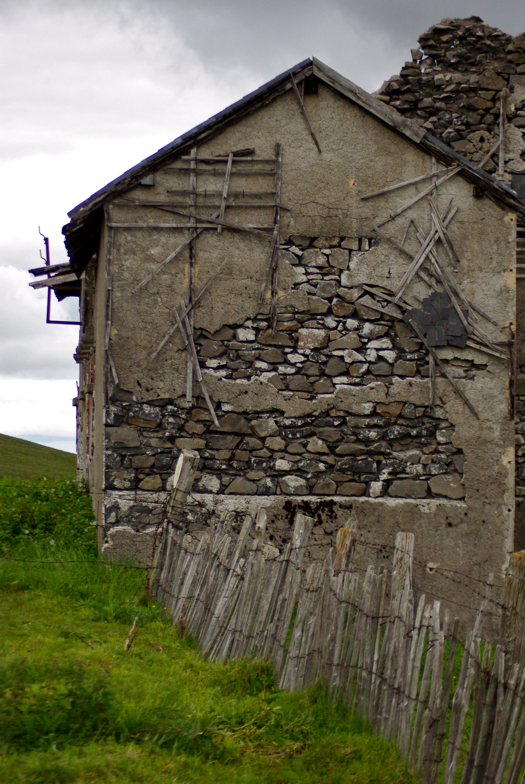
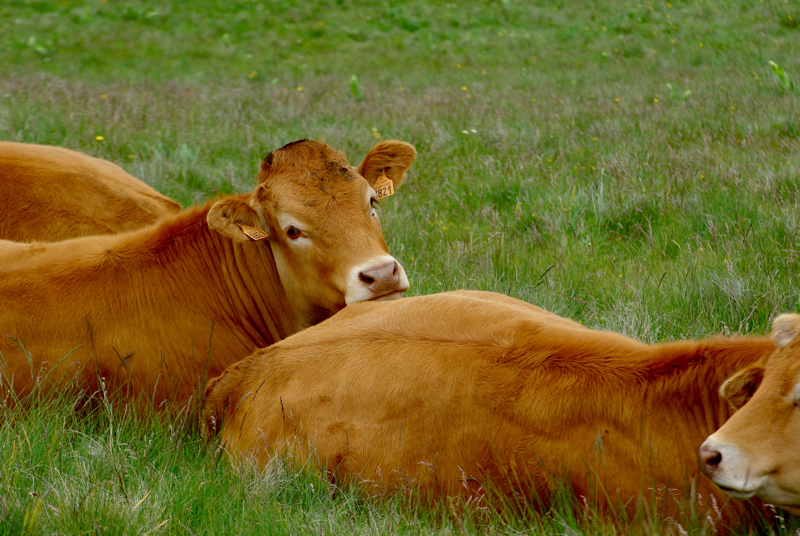
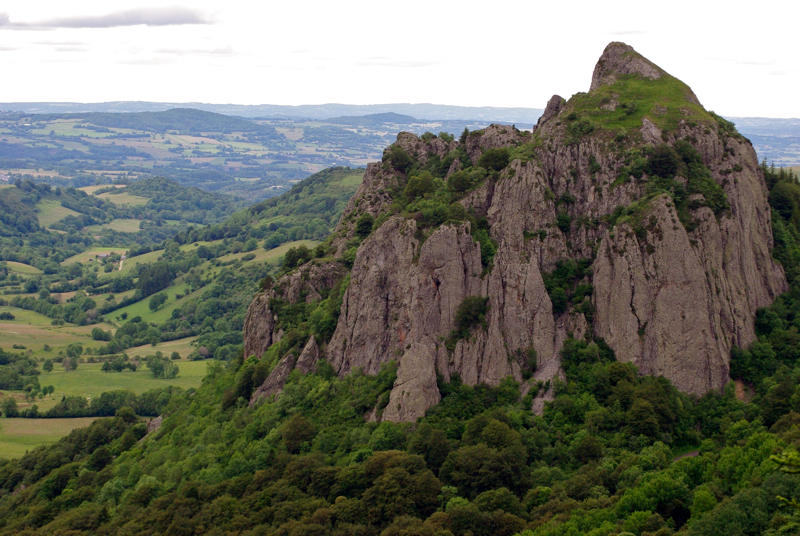


I have so enjoyed reading about your holiday, and am in total awe of your energy. To round off a busy vacation with a 20 km hike!!! David is an incredibly good sport - if I'd hurt myself and been electrocuted, I think I might have burst into tears! You certainly made the most of every moment of your trip, and must be returning home with all kinds of wonderful memories, as well as a very heavy suitcase full of books. :)
Haha, I know, I would have cried if so many bad things had happened to me! It's weird but as energy-intensive as hiking is, it's also very refreshing and relaxing for me. Especially if there aren't too many other people on the trail, as was the case here...being out in the fresh air and concentrating on the physical exertion is soothing. I live in the city and there are many things about an urban setting that I love, but they can be exhausting to me.
And yes, the suitcase was VERY heavy. :-)
Welcome home, Emily. Whenever I travel, I'm always totally ready to be home again, but only on the last day - no matter how long my trip. I fear that if I ever get the chance to encounter France as you have, I will never be ready to come home. Your photos are amazing. What do you shoot and what image software do you use?
This was the first trip in quite a while that made me feel conflicted about coming home—usually I'm very ready to head back, but this time I could easily have stayed another week or so. Though now that I'm home I'm super happy to see my dog and my neighborhood again. :-)
And thanks for the nice words on the photos. I have a Pentax K200D DSLR, and the lens that I most often use is a Tamron 70-300mm macro/telephoto one. It's kind of a weird "go-to" lens, but I inherited it from my dad and I do really like the flexibility of being able to do macro close-ups as well as zooming in on distant objects. The only downsides are that I have to get pretty far away from whatever I'm shooting, and that it's a narrow-angle lens - not great for sweeping landscapes. I'm starting to research a decent wide-angle lens since the only one I have is the kit lens and it's not very good.
Re: software, right now I'm just using iPhoto. I'd like something slightly more powerful and good for layout/design as well, but I'm not quite willing to shell out for Photoshop. :-)
Wow, that hike sounds amazing. Actually the whole trip sounds fantastic. I've really enjoyed your pictures & descriptions. Kinda sad you're back home honestly :) Maybe you could start running literature & textile based tours of Europe...
Not a half bad idea, Wendy! :-) I've thought about starting some kind of niche travel agent service at certain times, since I love trip planning so much. But have chickened out because it seems like people are transitioning away from using that kind of service. In any case, so glad you enjoyed the France posts!
I just want to acknowledge, formally and publicly, how awesome (in all senses of the word) this trip has been, and what an amazing job you did planning and documenting it for us, Sweetie! Truly, you are a wonder to behold.
I would also like to reiterate that I fully endorsed and encouraged the recounting of my mishaps, much as my position in Society will suffer following news of my rejection by The Cows. In the words of a much wiser man, "For what do we live, but to make sport for our neighbors, and laugh at them in our turn?" What, indeed.
What, indeed.
Thanks for the reassurance that it's okay to share your mishaps with the interwebs; I wouldn't like anyone to think that any relationships were harmed in the making of this blog post. :-) We had a great trip!
Emily, I have really been enjoying your travel stories and your beautiful pictures. What amazing experiences you and David have gone through (and I know what it's like to be electroluted by a fence -- I touched one when I was about 8 or 9 years old, and it actually caused me to be thrown back on the ground! Glad David survived that!).
I would love to visit Europe one day (Although I visited London 10 years ago), and especially France.
Yikes! Luckily it doesn't seem like David's electric shock from the fence was very severe; he was just like "Eeek, it's electric!" and let go in a hurry, but nothing dramatic like falling on the ground or having his hair stand on end. I loved London when I was there - really want to go back! And loved France, of course. :-)
Welcome home -- I have been avidly reading your blog entries, and am sad they have come to an end! Did you actually carry all those books home with you? Or mail some? aaaaargh!
I look forward to hearing more about it -- and learning something about teas, as well, when you are both able to come to NH next. I also have a wide angle lens I'd be happy to let you have...along with a 50 mm close-up lens -- I think that's what they are -- I just found them in their dust-covered little bags and wondered what I was going to do with them...it's been years since I have used them. they might fit! If you are interested I could actually take them out of the bags (!) and let you know what they are.
cheers -- Joan
Wow, thanks for the offer, Joan! I'd love to see of those lenses fit when we're there this fall—that would be exciting if they do. I'm so glad you enjoyed the France entries...and yes, I ended up toting all the books home. Amazingly, we shuffled our luggage so that even with all the books and wine we didn't have to pay excess baggage fees. Incredible!
What a gorgeous and interesting hike you had on your final day. Kudos to David for sticking it out with all the mishaps. I think if it were me at some point I would have declared I'd had enough and wanted to go home. Welcome back. I hope you are getting over your jet lag.
There actually was a point about halfway through when I would have suggested calling it a day in deference to David's injuries...but it was a big loop and the only way home was the way we were already going! He was an awesome good sport, though.
Re: jet lag, I'm getting to experience for a few days what it's like for you morning people. Up at 5 and asleep at 8, that's me. :-)
Heh. I actually manage to stay up until 9 or 9:30 before I'm sunk. It helps that the sun doesn't set until after 9 for the summer. There is something about sleeping when there is daylight that just seems wrong to me. My night owl sister thinks I'm nuts, I think she's crazy so we call it even :)
Gorgeous photos! I loved the open fields and pastures we hiked through in Ireland, after being used to the closed in woods of the Northeastern U.S. I love those woods too, but a change is nice. We also were constantly going through people's fields and over their fences -- no one seems to mind, though, which is great. I'm glad you enjoyed that hike, and everyone made it home relatively safely :)
Thanks! Oh yeah, I love the woods too - and it's actually pretty strange (from a North American perspective) to think about the extent to which European countries have been completely deforested. But the rolling green fields are beautiful, and it is interesting to try something new.
On the converse, I wonder how European tourists fare when they go on US hikes and find themselves in real wilderness. Is it true that there are areas of the Pacific Northwest that are as wild and almost as unexplored as they were when Europeans first arrived?
Yeah, that's a really good point. I wonder if it feels totally overwhelming to set out on a trail that just goes and goes for 100+ miles without encountering a town. Or the knowledge that if you want to go on a week-long hiking trip, you have to pack a week's worth of food! Plus bedding, 'cause you're sure not running into any inns.
Re: the PNW wilderness, I'm not sure about the answer to that. There are certainly huge swaths of designated wilderness, without paths or anything, some of which haven't been logged since European arrival. I'd imagine they have been explored, though, although you might not be able to tell. But you get into Eastern Oregon, and Eastern Washington...it is freaking RURAL out there. I wouldn't be surprised.